Benchmarks
Benchmarking hybrid drives is a little different than benchmarking normal hard drives or even SSDs. Many of the disk benchmarking programs out there test the sequential read and write speeds of a drive. This is not indicative of the real world performance of a drive of this type. It can take a few times of repeating the same task for the appropriate blocks to be cached and then deliver a performance boost. When you span a test over the whole of the drive, it doesn’t have a chance to cache anything. So while benchmarks like ATTO and HD Tune don’t reflect real world performance, it’s still important to run them as this is the kind of performance you can expect on data that hasn’t been cached yet.
ATTO Disk Benchmark
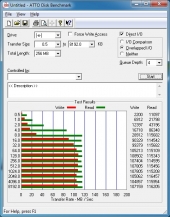 The Momentus XT performs in line with other 7200 RPM drives that are currently out in our ATTO benchmark.
The Momentus XT performs in line with other 7200 RPM drives that are currently out in our ATTO benchmark.
CrystalDiskMark
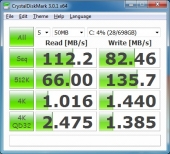 |
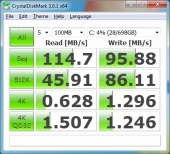 |
||
| 50MB | 100MB | ||
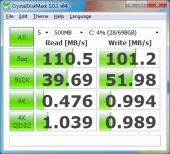 |
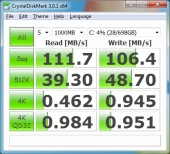 |
||
| 500MB | 1000MB |
We can see in this benchmark as well that scores are comparable to what you would see in regular 7200 RPM drives. What is interesting is that Seagate has increased the non-cached performance by as much as 20 MB/s from the previous generation.
HD Tune
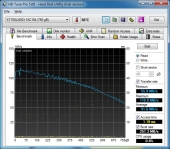 |
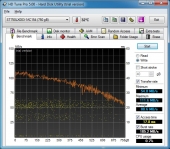 |
||
| Read Test | Write Test |
HD Tune’s sequential read and write tests post solid scores for the drive, but nothing mind blowing. Like what was stated before, this is not indicative of real world performance.
Performance Test
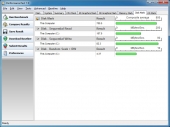 This benchmark shows the same as the prior ones, solid sequential read and write, but no indication of the caching feature.
This benchmark shows the same as the prior ones, solid sequential read and write, but no indication of the caching feature.
PCMark Vantage
 The PCMark suite is a full system benchmark that runs through various applications and tasks that a user might perform. This is a better representation of the performance that the Momentus XT can achieve.
The PCMark suite is a full system benchmark that runs through various applications and tasks that a user might perform. This is a better representation of the performance that the Momentus XT can achieve.
PCMark 7
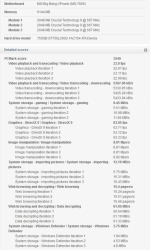 PCMark 7 breaks down their storage benchmark a bit better than Vantage. We can see in the gaming performance test that by the second iteration, the score has double and then increases still by the third. This shows the caching system kicking in and delivering SSD performance. This will help improve load speeds in games and other common applications that you run.
PCMark 7 breaks down their storage benchmark a bit better than Vantage. We can see in the gaming performance test that by the second iteration, the score has double and then increases still by the third. This shows the caching system kicking in and delivering SSD performance. This will help improve load speeds in games and other common applications that you run.
